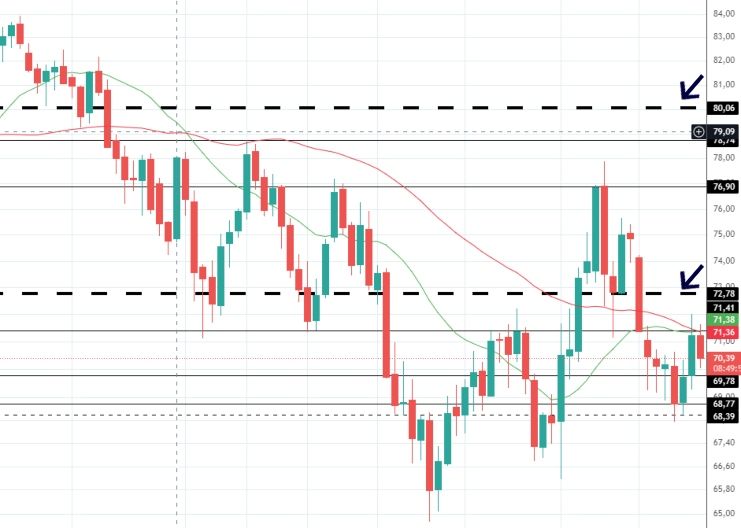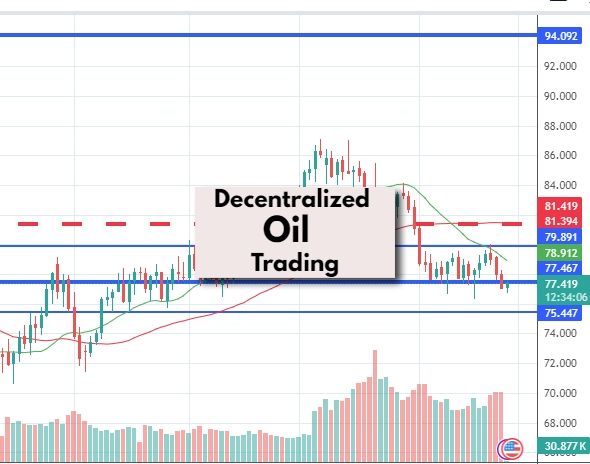Decentralized Oil Trading (WTI). Discover the benefits of decentralized trading, technical analysis for WTI and direct access to the trading platform.
Decentralized oil trading allows trading the WTI without a broker, keeping complete control over your money.
What are the benefits of decentralized oil trading (WTI)?
Decentralized oil trading, particularly with West Texas Intermediate (WTI), offers several benefits:
-
Increased Transparency:
Decentralized platforms often use blockchain technology, providing a transparent and immutable ledger of all transactions. This transparency helps reduce fraud and ensures all participants have access to the same information.
-
Reduced Intermediaries:
By eliminating intermediaries such as brokers or banks, decentralized trading can reduce transaction costs and increase the efficiency of trading processes. This can lead to better pricing for traders.
-
Enhanced Security:
Blockchain technology used in decentralized trading platforms provides a high level of security. Transactions are encrypted and decentralized, making it difficult for hackers to alter the data or steal information.
-
Accessibility:
Decentralized trading platforms can be accessed globally, allowing participants from different regions to trade oil without the need for a centralized authority or compliance with specific regional regulations. This can increase market participation and liquidity.
-
Faster Settlement Times:
Traditional oil trading can involve lengthy settlement periods. Decentralized trading platforms can significantly speed up the settlement process, as transactions can be executed and verified almost in real time.
-
Reduced Market Manipulation:
The transparency and decentralized nature of these platforms make it harder for single entities to manipulate the market. All transactions are visible on the blockchain, which can deter manipulative practices.
-
Improved Efficiency:
Smart contracts can automate various aspects of trading, such as the execution of trades, settlement, and compliance checks. This automation reduces the need for manual intervention and speeds up the trading process.
-
Cost-Effectiveness:
By cutting out intermediaries and reducing the need for extensive paperwork and manual processes, decentralized trading can lower the overall costs associated with trading oil.
-
Anonymity and Privacy:
Decentralized platform trading can offer greater privacy and anonymity for traders who prefer to keep their trading activities discreet. This can attract participants who are concerned about privacy.
-
Global Market Access:
Decentralized platforms are often accessible from anywhere in the world, providing opportunities for investors and traders from different regions to participate in the oil market without the constraints of local regulations or market access issues.
Overall, decentralized oil trading can bring about a more transparent, efficient, and secure market environment, benefiting traders and the market as a whole.
Decentralized Oil Trading (WTI) – technical analysis

Current WTI Situation:
The WTI oil market in October 2024 remains highly volatile, with prices currently fluctuating around USD 70.30 per barrel. This continuous price decline, compared to the levels observed in August, is primarily due to weakened demand in China, which is still grappling with a significant economic slowdown. This factor remains crucial for oil price fluctuations, given China’s central role in global energy demand.
Additionally, OPEC+ has maintained cautious outlooks regarding potential production increases, though significant hikes have not yet been confirmed. This anticipation of a possible supply increase continues to put downward pressure on prices.
Technical Analysis for October 2024:
WTI prices have recently tested a key support zone between USD 68 and 69. Although the support at USD 68 has held, recovery attempts continue but lack sufficient volume to sustainably stabilize prices above the USD 72.78 level. A failure to defend the USD 70 support could push prices down to USD 65 in the coming weeks.
Outlook for a Bullish Trend:
To consider a bullish reversal, it is crucial for WTI prices to break through the USD 68 zone with significant volume. Key levels to watch are:
- To the upside: USD 72.78 – 76.90
- To the downside: USD 70 – 68.70
Future Projections:
Forecasts for the remainder of 2024 remain uncertain and will heavily depend on geopolitical tensions and global economic conditions. The demand slowdown, especially in China and Europe, weighs heavily on prices. Furthermore, if OPEC+ decides to significantly increase production, this could exacerbate the market oversupply, putting additional downward pressure on prices. The expected range remains moderate, between USD 65 and 75 per barrel, in the absence of major external events.
In summary, the WTI market appears to be in a bearish or stagnant dynamic, with few bullish factors in the short term, unless a major geopolitical or climatic event disrupts this trajectory.
Direct access to the decentralized trading platform
Community of experienced traders in the Forex, commodities and crypto markets, offering articles to help you learn about trading through: relevant information – technical and fundamental analysis. Specificity: specialized in decentralized trading.
Communauté de traders expérimentés sur les marchés du Forex, matières premières, cryptos, offrant des articles permettant de s’éduquer au trading à travers : information pertinente – analyse technique et fondamentale. Spécificité : spécialisé dans le trading décentralisé.
